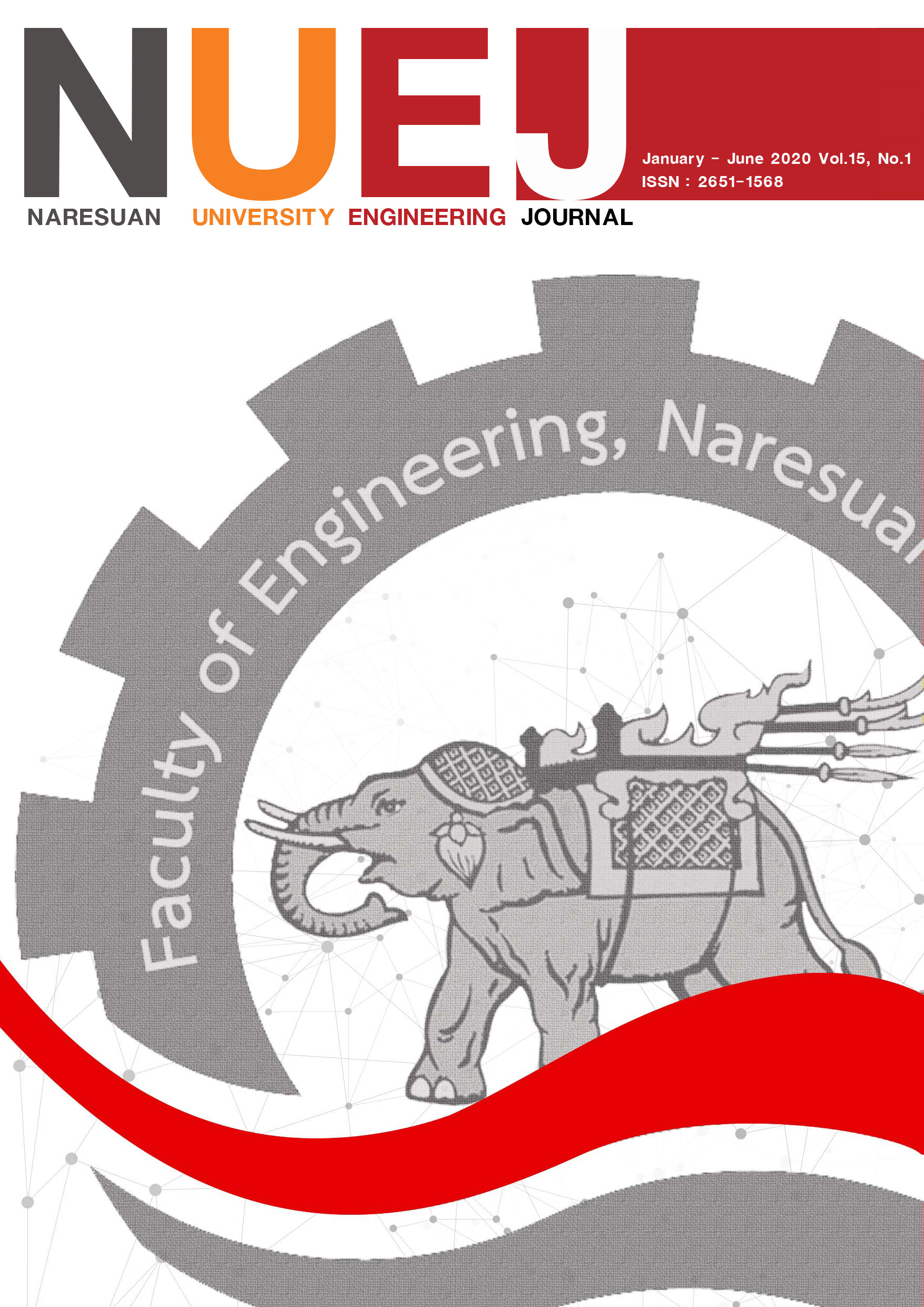A Genetic Algorithm for Hybrid Flow Shop Scheduling
Main Article Content
Abstract
The objective of this research is to apply a genetic algorithm for a hybrid flow shop scheduling problem in a steel plate production company. The manufacturing orders from customers are different in the characters of sizes and quantities. Besides, there are 3 main processes; slitter process, shear process, and squared shear process. Moreover, processes have unequal number of machines and production rates. The conditions are the products must go thru all processes sequentially and can select any machines in the process. The author applied a genetic algorithm with two objective functions; minimized makespan ( ) and minimized mean flowtime ( ). The algorithm was tested with the problem size of 5, 10, 15, and 20 orders in order to be compared with the current method of the company. The results showed that the genetic algorithm could decreased the average makespan by 12.99% and decreased the average mean flowtime by 26.48%. Moreover, it found that the production planning time was decreased by 58.74% when compared with the current method. In conclusion, the genetic algorithm could reduce makespan, mean flowtime, and production planning time significantly.
Article Details
References
Carlier, J., & Neron, E. (2000). An exact method for solving the multi-processor flow shop. Rairo Operations Research, 34, 1-25.
Chaimanee, A., & Supitak, W. (2013). Flexible production scheduling on Parallel machinery in the manufacturing industry. KMITL Information Technology Journal, 25(2), 219-231.
Chaimanee, A., & Supithak, W. (2015). Fleible Flow Shop Scheduling Problem with Sequence Dependent Setup Time under Just-Tn-Time Philosophy. The Journal of KMUTNB, 25(2), 219-231.
Ebrahimi, M., Ghomi, S. M. T., & Karimi, B. (2014). Hybrid flow shop scheduling with sequence dependent family setup time and uncertain due dates. Applied Mathematical Modelling, 38(9-10), 2490-2504.
Engin, O., Ceran, G., & Yilmaz, M. K. (2011). An efficient genetic algorithm for hybrid flow shop scheduling with multiprocessor task problem. Applied Soft Computing, 11, 3056-3065.
Genetic Algorithm. (2019). Simple Genetic Algorithm. http://kb.psu.ac.th/psukb/bitstream
Ibrahim, A. A., El-shaer, R. H., Al-rwasheda, H. A. & Nawarra, G. M. (2013). Flow Shop Scheduling using Genetic Algorithm: Historical review and categorization of procedures. The Egyptian Journal for Engineering Sciences and Technology, 16(3), 1671-1685.
Jarboui, B., Siarry, P., & Teghem, J. (2013). Metaheuristics for Production Scheduling. ISTE Ltd.
Kahraman, C., Engin, O., kayk, I., & Ozturk, R. E. (2010). Multiprocessor task scheduling in multistage hybrid flow-shops: A parallel greedy algorithm approach. Applied Soft Computing, 10(4), 1293-1300.
Karthik, S., & Prabahara, T. (2014). Hybrid Flowshop Scheduling Using Discrete Harmony Search and Genetic Algorithm. International Journal of Innovative Research in Science, Engineering and Technology, 3(3), 1197-1202.
Morais, M. de F., Boiko, T. J. P., Federal, L. dos S. C., Peterson da Rocha, R., & Paraíso, P. R. (2014). Multicriteria hybrid flow shop scheduling problem: literature review, analysis, and future research, Independent Journal of Management & Production, 5(4), 1004-1031.
Oguz, C., & Ercan, M. F. (2005). A genetic algorithm for hybrid flow-shop scheduling with multiprocessor tasks. Journal of Scheduling, 8, 323-351.
Parakawong na ayuthaya, P., Pornsing, C. (2018). Design of Experiment to Waste Reduction Injection Process of Electronic Parts [Master’s thesis]. Silpakorn University. http://ithesis-ir.su.ac.th/dspace/handle/123456789/2110
Polkavilat, A. (2011). Application of Genetic for Optimisation Problem. RMUTP Research Journal, 5(2), 153-163.
Ribas, I., Leisten, R., & Framinan, J. M. (2010). Review and classification of hybrid flow shop scheduling problems from a production system and a solutions procedure perspective. Computers & Operations Research, 37, 1439–1454.
Ruiz, R., Antonio, J., & Rodríguez, V. (2010). The hybrid flow shop scheduling problem. European Journal of Operational Research, 205, 1–18.
Sangudon, S., & Wuttipornpun, T. (2012). Application of Hybrid Genetic Algorithms for Assembly Flow Shop Scheduling Problem. The Journal of KMUTNB, 22(1), 107-117.
Songserm, W., Wuttipornpun, T., & Jaturanonda, C. (2018). Hybrid Metaheuristics and Linear Programming for Finite Capacity MRP in Multi-Stage Flexible Flow Shop with Permutation and Non-permutation Scheduling Options. Applied Science and Engineering Progress, 11(3), 173-183.
Songserm, W., Wuttipornpun, T., & Jaturanonda, C. (2018). Hybrid Metaheuristics and Linear Programming for Finite Capacity MRP in Multi-Stage Flexible Flow Shop with Permutation and Non-permutation Scheduling Options. KMUTNB International Journal of Applied Science and Technology, 11(3), 173-183.
Soponchai, S. (2000). Computer Aided Die Production Scheduling for Automotive Parts Industry [Master’s thesis]. Chulalongkorn University. http://www.thaithesis.org/detail.php?id=1082543001269
Yilmaz, M. K., Kaya, I., Engin, O., & Kahraman, C. (2008). An application of effective genetic algorithms for Solving Hybrid Flow Shop Scheduling Problems. International Journal of Computational Intelligence Systems, 1(2), 134-147.


